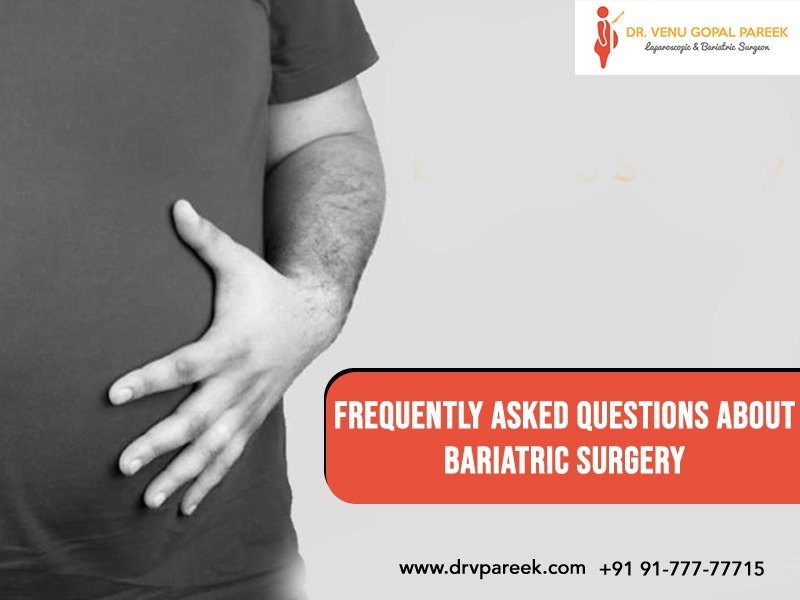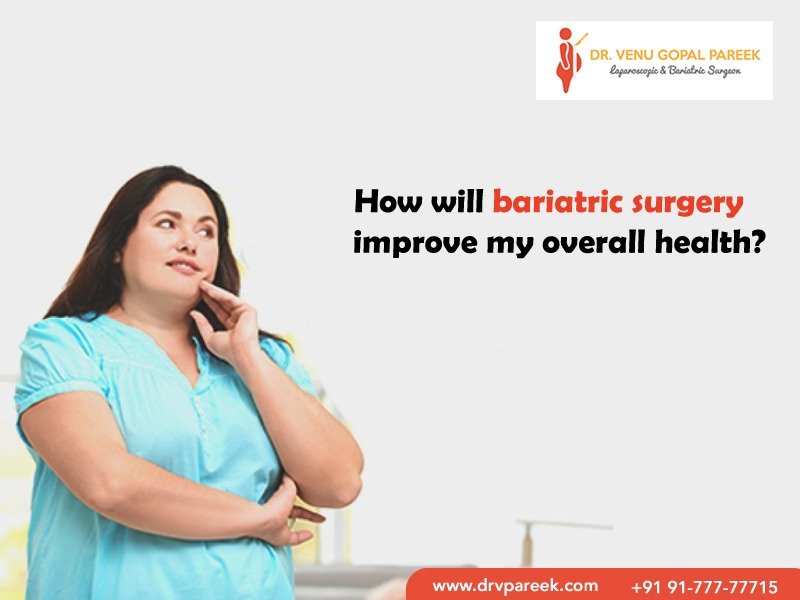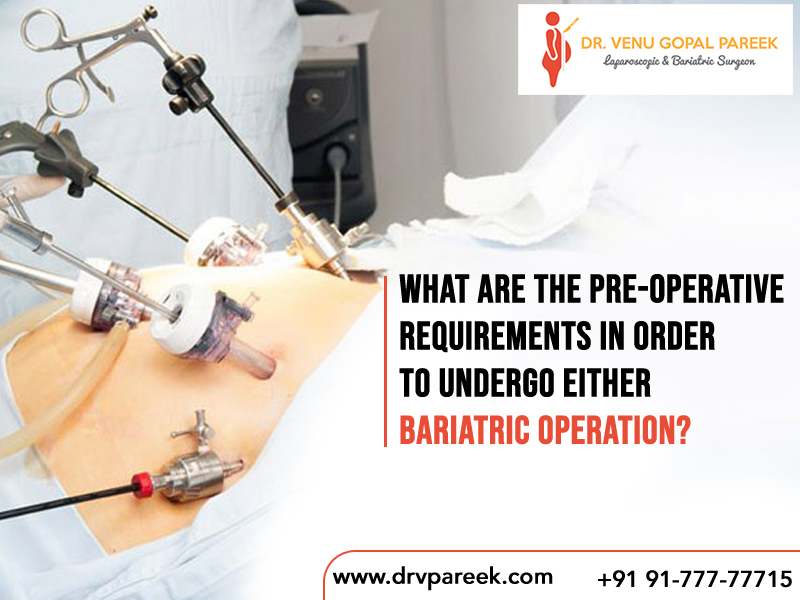
Recovery From Bariatric Surgery -What To Expect
Obesity is a complex disease to treat and is associated with many other medical problems. Obesity treatment is more than just diet or surgery. Patients should expect a new lifestyle that combines healthy eating, exercise and regular visits to a hospital. This approach offers the best chance of success in preventing weight recovery and the return of medical problems.
The best time to research bariatric surgery is before the surgery. This way, your life will be easier and more predictable after weight loss surgery. Get basic answers to your bariatric surgery questions here in this article provided by Dr Venu Gopal Pareek, then talk to your doctor.
Recovery and Weight Loss after surgery
How quickly you lose weight after surgery will depend on the type of weight loss surgery and how well you followed your doctor’s diet and exercise guidelines.
According to the National Institutes of Health, you will likely lose 10 to 20 pounds a month during the first few months after surgery. But the rate of weight loss after bariatric surgery slows down over time. The American Society for Metabolic and Bariatric Surgeons says you can lose up to 60 per cent of your excess body weight and 77 per cent of your excess weight in the first six months after surgery.
Some reports suggest that patients who undergo sleeve gastrectomy or gastric bypass surgery lose weight faster than patients who undergo lap band surgery. And diets that are liquid or pureed tend to lose weight faster than diets that return to solid foods.
Living while recovering from bariatric surgery
The answer to this question may depend on your expectations before the operation. Many patients experience improved quality of life when they lose the weight they hoped. Other factors include whether they will experience complications from the surgery and whether the surgery will resolve any medical problems related to their weight.

Talking about expectations should be an essential part of your preoperative process. Bariatric surgeons often see relationships with friends and family change after surgery. In many cases, lifestyle adjustments and psychological changes can be the most challenging part of recovery.
In many cases, bariatric surgery resolves or corrects weight-related disorders. Gastric bypass improves type 2 diabetes in nearly 90 per cent of patients, and gastric bypass improves the condition in more than 70 per cent of patients. Sleep apnea resolves in more than 85% of patients, and nearly half of patients who undergo weight loss surgery see an reduced risk of heart disease.
The first year follows instructions for bariatric surgery.
After bariatric surgery, you will need to change the way you eat and approach food entirely. It’s also important to incorporate exercise into your daily routine.
To help you with these lifestyle changes and weight loss success in the first year after gastric bypass, sleeve gastric, or laparoscopic band surgery, we have below guidelines:
- Start your diet after having bariatric surgery. Your bariatric surgeon will guide you through the four phases, from fluids to stabilization.
- They will give you tips on using protein supplements to meet your daily protein needs.
- Arrange for comprehensive follow-up support and educational services.
Each one is unique: what to expect after bariatric surgery.
While many people lose 50 per cent of their body weight after surgery, each one is unique. Some people burn fat faster than others. There are no definite expectations about how much weight you will lose in the first, second, or third year after surgery.
- Weight loss surgery should not be viewed as a quick fix. Following a diet and exercise plan will maximize results.
- Stay motivated by setting clear goals and realistic expectations. And don’t forget to celebrate victory regardless of size.
- After all, losing weight is more than just a numbers game. If you limit your perception of success to what you see on the scale, you may not be able to see how far you have come.
- There are many other micro achievements out there that can be just as beneficial. When your waist decreases or you get closer to pants, you never thought you might wear them again; it means your lifestyle functions well after weight loss surgery.
Recovery after bariatric surgery
After surgery, you will be taken to a recovery room and stay there for 1-2 hours. Your nurse will closely monitor your vital functions, and pain and nausea will be assessed and treated appropriately. Your family will be notified that the operation is complete, and they can talk.
You are expected to get up and walk in the after 4-6 hour after you arrive at the room. Walking is one of the parts of your recovery. Walking improves blood circulation, increases oxygen supply and aids in the healing process, reduces the chance of blood clots, and reduces the pressure and swelling that often occurs after surgery. Coughing and deep breathing and using your stimulation spirometer are also essential parts of the recovery process. Your nurse will teach you these techniques after surgery.

Incision care
Do not shower; enter the hot tub or swimming pool for one week after surgery. You can take a shower any time after surgery as your surgeon uses absorbent sutures and biodegradable skin glue on your wound. There are no bandages or stitches to remove. If you experience redness or unusual drainage at the site, contact the doctor immediately.
Medications:
The doctor gives a tablet-like pantoprazole 40 mg taken by mouth daily to reduce acid reflux (you should take this medication until the doctor tells you to stop). You can usually stop taking this medication after six months. He has also given your pharmacy a prescription for the elixir 250 mg / 5cc Gabapentin, which should be taken twice daily if there are complaints. Ensure you are taking liquid Tylenol for adults (paracetamol 160 mg / 5 ml) for consumption if you experience symptoms. If necessary, you can take 15 ml of the elixir of paracetamol every 4-6 hours.
Daily activities
Don’t lift anything more than 10 kgs for ten days—no vigorous exercise or lifting anything heavy for four weeks after surgery. Go home and rest on the day you leave the hospital, but we want you to get up and go walking multiple times. This not only helps the lungs but also removes gas build-up, speed recovery and improves circulation. Start slowly; get through the first few days of work fast and stick to it for at least 30 minutes 3 days a week. Create an up-to-date calendar of your workouts by noting the number of minutes you spend each day. Remember to bring your calendar and textbook with you whenever you visit after surgery. Use your stimulation spirometer at least three times an hour while awake for the first week after surgery to avoid pneumonia.
Driving
DO NOT drive a vehicle for at least seven days after surgery or while taking medication. Make sure you can turn, stop and drive the car safely and comfortably
before driving.
Diet
You are not allowed to eat or drink anything on the day of the surgery. You may be given a few ice cubes. The morning after surgery, you can be taken to the X-ray department, where you will get a top-line GI. You will be given a small drink (gastrografin) to swallow when you take an X-ray of the fluid that has entered your stomach. This is done to check your new stomach and check for leaks. As soon as the radiologist Doctor contacts you, you will start your STEP 1 DIET.
Phase 1 diet
While you are in the hospital, the foodservice provides you with clear protein (which you need to soak), water, broth and jelly. Everything will be at room temperature because, at this time, you can not tolerate extreme heat and cold. You will use a schedule and a measuring cup to sip 2 ounces of protein per hour and small sips of one to two ounces of clear liquid every 15 minutes.

Postoperative follow-up with the doctor
You must make a two-week appointment and all other appointments for the first year with the doctor during your previous visit. You must bring your book and make the next appointment for your follow up. Your follow-up is critical to your success and lasts two weeks, one month, three months, six months, nine months, one year, and every year after that. If you are unable to make an appointment for any reason, please contact the doctor at least 24 hours in advance and let us know so we can reschedule your appointment.
Exercises after bariatric surgery
You should consult your care team before continuing or starting any exercise program after surgery. Most patients can begin exercising about six weeks after the procedure. However, it would help if you walked for a few minutes every day as soon as you return home.
Discharge Instructions:
Once you get home, there are things you need to be aware of. These are general guidelines to help you through the recovery process. If you have questions, concerns, or feel something is “wrong,” contact Dr VenuGopal Pareek at 091777 77715.
Signs and Symptoms to Call Your Surgeon
- Fever over 101
- Blood vomiting
- It is impossible to swallow or retain fluids
- Heart racing with shortness of breath
- Vomiting continuously
- Sudden pain in the left hand
- Blood in stool
- Leg swelling
What is the recovery phase, like in bariatric surgery?
Most weight-loss surgeries are laparoscopic, which means they are minimally invasive. In this procedure, the surgeon makes several small incisions instead of one large incision, reducing pain and shorter recovery time. Patients usually stay in the hospital for two to three days before returning home. Many of them can return to work in a week or two but may struggle with low energy at first.
Patients often start their exercise program in the hospital. Recovery begins with short walks and light, low-impact activities. If accepted slowly, patients can usually do weight training or lift weights in the first month and immediately return to all routine activities. It would help if you made sure that you gradually increase the intensity of this activity over several weeks.
Conclusion:
Choosing to have bariatric surgery is a complex process. Knowing what to expect after surgery can help you decide if the procedure is proper for you. Don’t be afraid to ask questions to your doctor and get as much information as possible. For more information, contact Dr Venu Gopal Pareek at 091777 77715.







